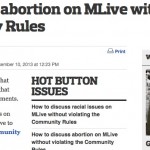Online Journalism Archive
24 Jun 2014
How to build a better journalism school: Part 5, storytelling

The most common way journalism schools have adapted to a changing industry (at least based on my small survey of about 20 top programs) is the insertion into the curriculum of a course called, most often, “multimedia storytelling.” This course description, from Northwestern, is typical: Introduction to using multimedia skills to create effective web-based journalism.
23 Jun 2014
How to build a better journalism school: Part 4, grammars

I had a traditional education in journalism school, focused on newspapering. That includes learning several rules for writing headlines — cutting out forms of the verb “to be,” not breaking phrases between the first and second lines of a multi-line headline, making all the lines of a headline roughly the same length. Rules like that
18 Jun 2014
How to build a better journalism school: Part 1, the core curriculum

Many journalism schools are reconsidering their curricula, trying to adapt to industry changes. Much of the discussion has focused on technology and entrepreneurial skills. Over the next several posts, I will propose and defend an alternative approach. To start, here’s how I would set up the core of an undergraduate journalism program designed to be
06 Mar 2014
Online enterprise reporting: How to get it right

The longer I was involved in online journalism, the more I realized how different it needs to be from what print newsrooms are used to. The more, too, I realized that much of what I thought was a part of “good journalism” was really just good print journalism. Here’s another case in point: enterprise stories.
09 Feb 2014
Anonymous comments and the mythical Facebook fix: Jen Eyer’s TEDx talk

In this video, Jen Eyer makes the case for anonymous comments. I have been a fan of her work with comment moderation for several years; she made MLive’s comment area into what I hoped cleveland.com would be when it grew up. MLive isn’t perfect. But perfection isn’t possible — not even if you “require” real
30 Jan 2014
5 tips for print newsrooms shifting to online focus

If the announcements from Digital First Media and the San Francisco Chronicle are any indication, the rest of America’s newspapers are waking up to the reality that Advance Digital figured out a few years ago: Future success in news depends on adapting to online, and that means cutting loose from the print mindset. Steve Buttry,
29 Jan 2014
Welcome to the digital future, Digital First and San Francisco Chronicle

In the last few days, the tide seems have turned in America’s newspaper newsrooms. The San Francisco Chronicle’s managing editor, Audrey Cooper, talked in detail about the paper’s plans to revamp its focus: “You look around this newsroom and it looks like it did in that photo in 1958,” she said. “The only thing that
26 Jan 2014
Plain Dealer dumps PolitiFact … and about time, too

The Plain Dealer and its stable-mate, the Northeast Ohio Media Group, are finally doing the right thing about PolitiFact. They’re quitting. It’s for the wrong reason, but I’ll count my blessings. The operation’s Ted Diadiun reports: I should note that although some editors shared my dismay over the Truth-O-Meter, that did not figure in the
23 Jan 2014
Homeopathic journalism, or the rise of the single-source story

I’ve learned that one thing, at least, hasn’t changed in the nearly 40 years since I started journalism school: the reluctance of young students to interview strangers. Some of my colleagues at Kent State, where I’m now teaching a Media Writing class, were talking about assigning interviews in a basic reporting class. Students almost invariably
14 Jan 2014
CJR flings another handful of poo at nola.com and Advance Digital

I’m assuming there’s a dartboard in the offices of the Columbia Journalism Review that has Advance Digital or one of its top bosses in the bullseye, because at least two of its staff — Ryan Chittum and Dean Starkman — seem to be determined to poke as many holes in the Newhouse company’s plans as
